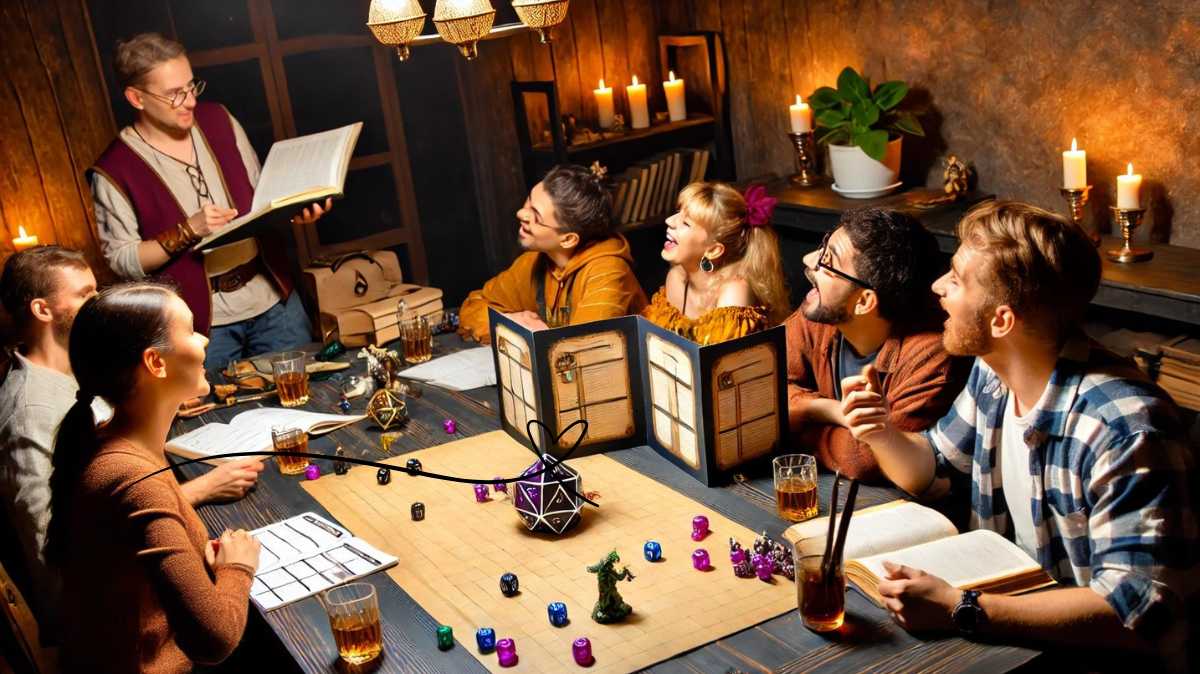Tabletop RPGs (Role-Playing Games) are more than just a form of entertainment—they’re a cultural phenomenon. Over the years, they’ve captivated millions of players worldwide, immersing them in worlds filled with adventure, fantasy, and strategic depth. But what is a tabletop RPG? In this in-depth guide, we’ll explore the definition, history, mechanics, and cultural impact of tabletop role-playing games. If you’re curious about entering this dynamic world, this is the ultimate resource to start your journey.
Table of Contents
Introduction to Tabletop RPGs
Tabletop Role-Playing Games (RPGs) are narrative-driven games where players assume the roles of characters in an imaginary world. These games are typically played around a table (hence, “tabletop”) and involve collaborative storytelling. Players describe their character’s actions verbally, while the Game Master (GM) serves as the game’s referee and storyteller.
In a tabletop RPG, there is no board or predetermined path; instead, players navigate through fictional environments, complete quests, and interact with each other and the world based on the game’s rules. A major appeal is the creative freedom they offer: players shape the storyline through their choices, leading to a unique experience every session.
History of Tabletop RPGs
The history of tabletop RPGs dates back to the early 1970s when Gary Gygax and Dave Arneson created Dungeons & Dragons (D&D), the first formal tabletop RPG. It built upon earlier wargaming traditions, where players controlled armies in military scenarios. D&D added individual characters, story elements, and the fantasy genre to the mix.
Since its inception, D&D has set the stage for many other RPG systems, influencing not only the gaming world but also film, literature, and even technology. As tabletop RPGs evolved, they diversified into various genres including science fiction, horror, and cyberpunk.
For a detailed look at the history of Dungeons & Dragons and its profound cultural influence, visit the official site of Dungeons & Dragons.
Core Components of a Tabletop RPG
To understand what is a tabletop RPG, it’s essential to explore the core components that define it:
- The Players: Participants who control individual characters and make decisions for them within the game world.
- Game Master (GM): The player responsible for narrating the story, setting the scene, and enforcing the game rules.
- Rule System: Each tabletop RPG operates with a specific set of rules or mechanics that determine how the world functions. These include combat systems, skill checks, and dice rolls.
- Character Sheets: These are detailed records of each character’s abilities, stats, and inventory, which guide gameplay decisions.
- Narrative: The overarching story and plotlines that evolve during gameplay.
Different Types of Tabletop RPGs
Tabletop RPGs aren’t a one-size-fits-all genre. They can be divided into several subtypes based on genre and mechanics:
- Fantasy: Games like Dungeons & Dragons focus on magic, mythical creatures, and medieval settings.
- Science Fiction: Titles such as Traveller and Starfinder immerse players in futuristic worlds filled with advanced technology and space exploration.
- Horror: Games like Call of Cthulhu emphasize suspense and psychological terror, often taking inspiration from classic horror literature.
- Superhero: Mutants & Masterminds lets players assume the role of comic book-style heroes with incredible powers.
- Cyberpunk: Set in dystopian futures, games like Cyberpunk 2020 and Shadowrun combine technology with gritty, urban landscapes.
How to Play a Tabletop RPG
Playing a tabletop RPG starts with gathering a group of players and selecting a game system. Typically, a session proceeds through the following phases:
- Character Creation: Each player designs a character, often by rolling dice to determine attributes like strength, intelligence, and charisma.
- Game Setup: The GM explains the game world, sets the scene, and introduces the players to the current scenario.
- Role-Playing & Actions: Players describe their character’s actions, which could be anything from negotiating with an NPC (non-player character) to fighting a dragon. Dice rolls often determine the success or failure of these actions.
- Combat: When battles occur, turns are taken to determine actions (like attacking or defending) based on initiative and dice rolls.
- Narrative Progression: As the game progresses, the players’ actions shape the storyline, which the GM responds to by introducing new challenges, environments, and characters.
Popular Tabletop RPG Systems
There are hundreds of tabletop RPG systems, each offering unique mechanics and settings. Some of the most popular include:
- Dungeons & Dragons: The best-known RPG, focusing on fantasy settings.
- Pathfinder: A spin-off of D&D’s 3.5 edition, with a more complex ruleset.
- Call of Cthulhu: A horror RPG inspired by the works of H.P. Lovecraft.
- GURPS (Generic Universal RolePlaying System): A flexible system that allows for any setting or genre.
- Warhammer Fantasy Roleplay: A dark fantasy RPG based in the Warhammer universe.
For more insight into specific systems, visit the DriveThruRPG platform to explore game rules, expansions, and community content.
Role of the Game Master (GM)
The Game Master (GM) plays a pivotal role in any tabletop RPG session. They act as both narrator and referee, ensuring that the game’s rules are followed while guiding the story. The GM manages the non-player characters (NPCs) and creates the scenarios players must navigate. Great GMs balance creative storytelling with fairness, offering players a challenging yet rewarding experience.
Creating Characters in Tabletop RPGs
Character creation is one of the most exciting aspects of any RPG. Players must choose their character’s race, class, skills, and backstory, all of which influence how they interact with the game world.
For example, in Dungeons & Dragons, a player might decide to create a Half-Orc Barbarian who excels in physical combat but has a troubled past. Alternatively, a Human Wizard might rely on spellcasting and intelligence to navigate challenges.
Worldbuilding in Tabletop RPGs
Worldbuilding is the process of constructing the game’s setting. This involves not only physical locations but also cultures, histories, and political systems that shape the world. In many games, worldbuilding is a collaborative process where the GM provides the foundation, but players also contribute by developing their characters’ backstories and relationships with the world.
Dice and Randomization in RPGs
A key feature of tabletop RPGs is the use of dice to introduce randomness. The most common type of dice is the 20-sided die (d20), particularly in games like Dungeons & Dragons. The outcome of many actions—whether it’s attacking a monster or attempting to pick a lock—is determined by a dice roll.
This randomness ensures that every game session is unpredictable, forcing players to adapt to successes and failures alike.
The Importance of Role-Playing
At the heart of every tabletop RPG is role-playing—the act of immersing yourself in your character’s personality, motivations, and decisions. Some players enjoy deep, narrative-driven role-play, crafting complex characters with emotional arcs. Others might focus more on combat and strategy. The beauty of tabletop RPGs is that there’s no right or wrong way to play.
Tabletop RPGs vs. Video Game RPGs
While both tabletop and video game RPGs share common elements (such as character progression and narrative depth), there are key differences. Tabletop RPGs offer far more freedom and creative control, as the story evolves in real-time based on players’ decisions. Video game RPGs, on the other hand, are limited by their programmed mechanics and storyline.
Cultural Impact of Tabletop RPGs
Tabletop RPGs have had a profound impact on pop culture. The resurgence of Dungeons & Dragons in recent years—partly due to shows like Stranger Things and live-play series such as Critical Role—has introduced a new generation to the joys of tabletop gaming. Additionally, tabletop RPGs have influenced video game design, literature, and even films.
For an in-depth analysis of this cultural resurgence, check out this New York Times article.
Benefits of Playing Tabletop RPGs
There are numerous benefits to playing tabletop RPGs, including:
- Creativity: Players are encouraged to think outside the box, devising creative solutions to problems.
- Teamwork: RPGs require collaboration, as players must work together to overcome challenges.
- Critical Thinking: Success in RPGs often hinges on strategy and quick decision-making.
- Social Interaction: RPGs foster social bonds, bringing people together in a shared experience.
How to Get Started with Tabletop RPGs
For beginners, starting with a simple, well-established system like Dungeons & Dragons or Pathfinder is a great choice. You can find starter kits that include all the essential materials: dice, rulebooks, and pre-made characters. Additionally, joining online communities like Roll20 makes it easy to connect with other players, whether you’re playing in person or virtually.
Frequently Asked Questions
Q1: How long does a tabletop RPG session typically last?
A typical RPG session lasts between 3 to 5 hours, but some groups may play longer depending on the campaign.
Q2: Do you need a lot of people to play a tabletop RPG?
Not necessarily. While most games are designed for groups of 4 to 6 players, some systems allow for solo play or smaller groups.
Q3: Are tabletop RPGs expensive?
Costs can vary. Basic rulebooks and dice are relatively inexpensive, but purchasing miniatures, maps, and other accessories can add up.
Q4: Can I play tabletop RPGs online?
Yes, with platforms like Roll20, Discord, and Fantasy Grounds, you can enjoy tabletop RPGs with players from all over the world.
Q5: What’s the difference between an RPG campaign and a one-shot?
A campaign is a long-running game with a continuous story, while a one-shot is a single-session adventure designed to be completed in one sitting.
Q6: Do you need experience to start playing RPGs?
No prior experience is necessary! Many games are designed to be beginner-friendly, and most groups are happy to teach newcomers.
Author

An aspiring business leader, I am working towards my dream of graduating from Stanford University with a degree in Business Management. Passionate about sharing knowledge, I strive to empower others through education and collaborative learning.
View all posts


